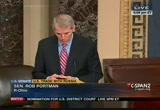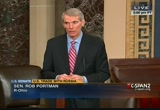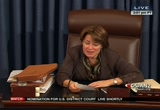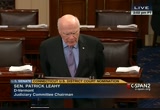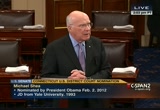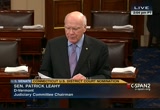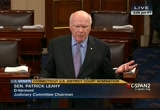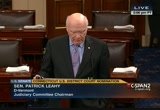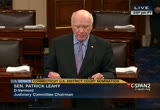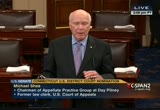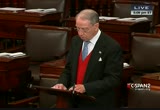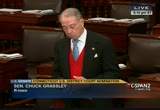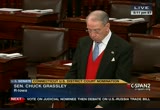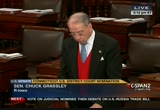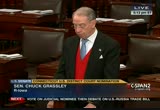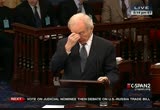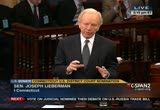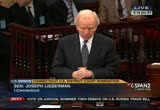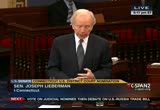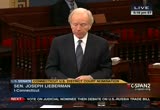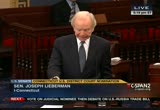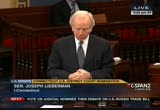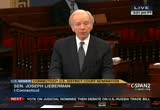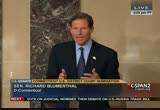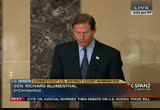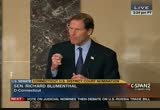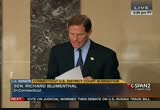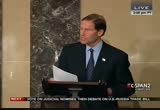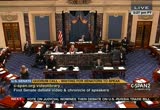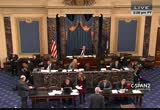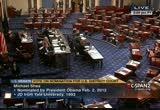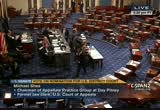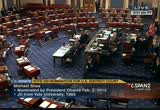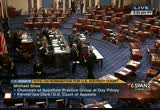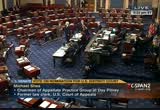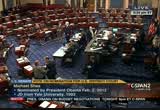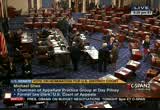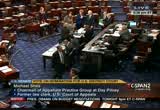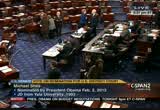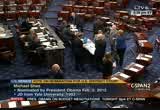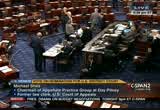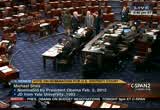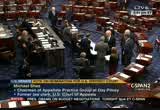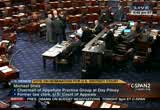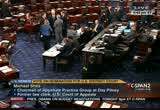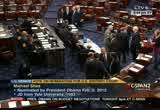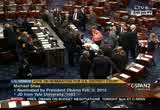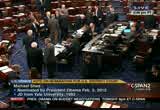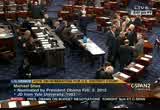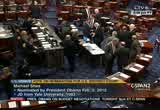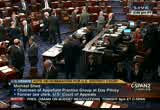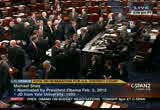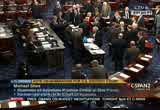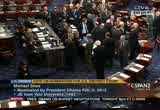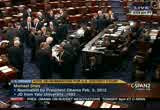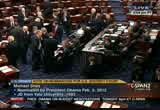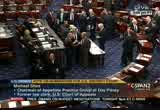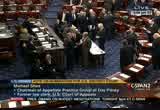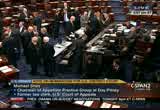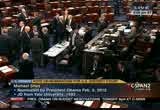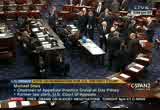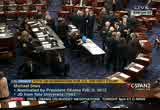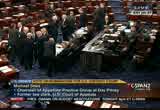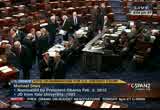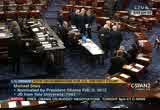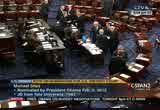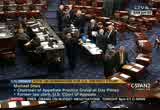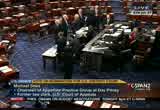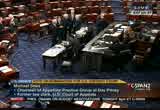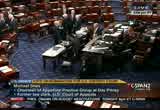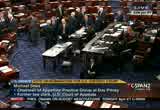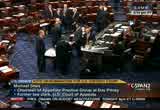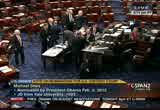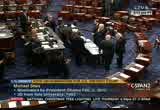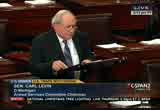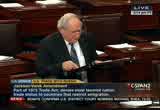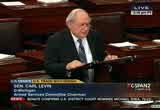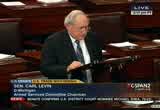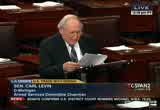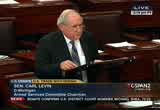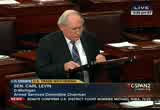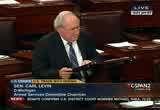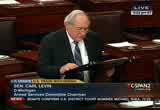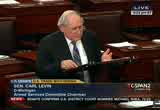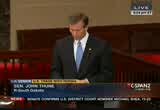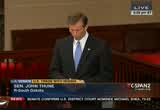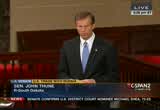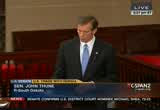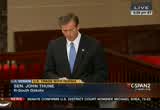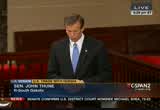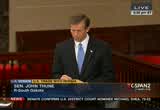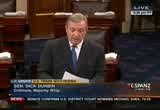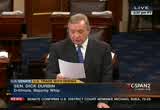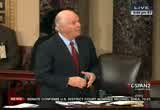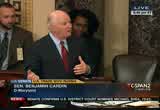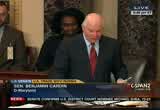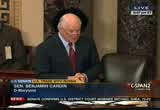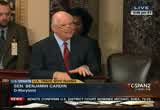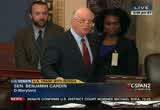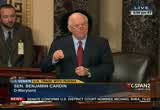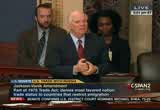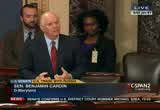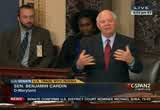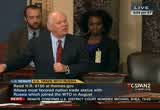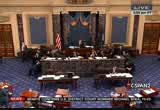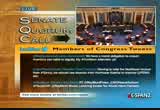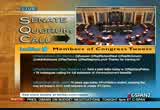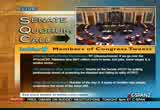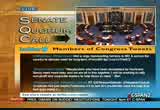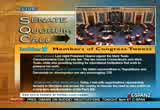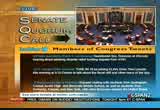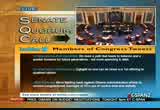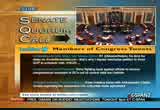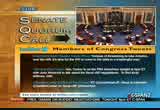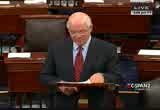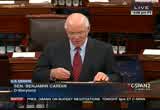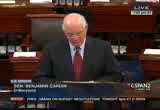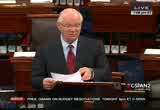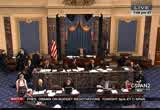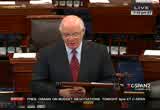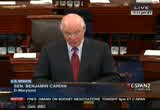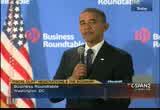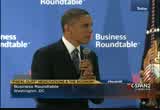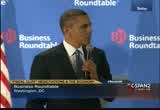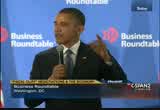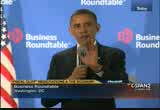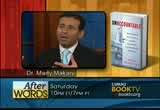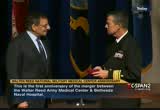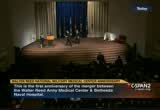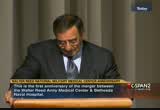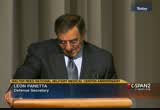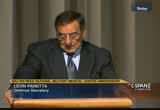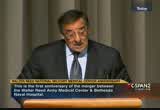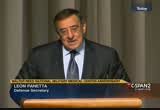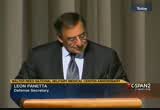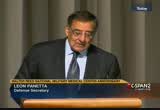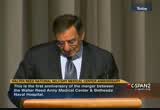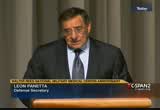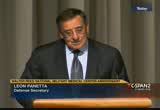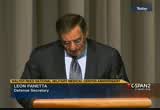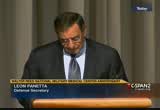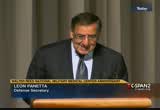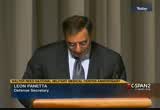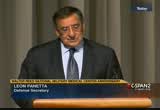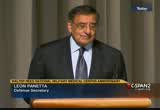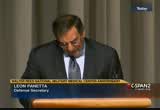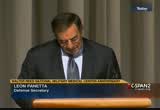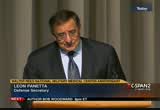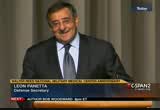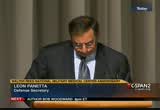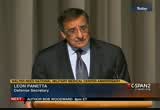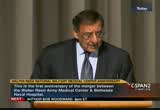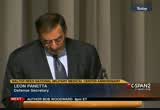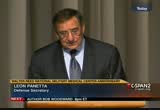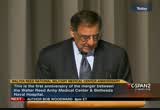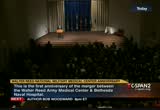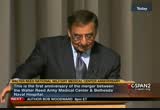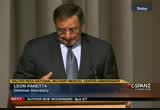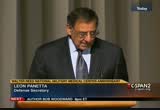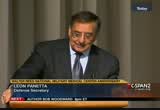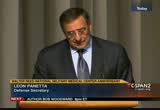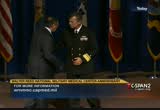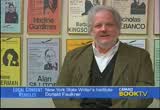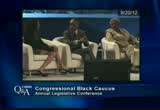tv U.S. Senate CSPAN December 5, 2012 5:00pm-8:00pm EST
5:00 pm
international standards. i'm pleased we're finally moving forward on this bill. i'm also disappointed we haven't made more progress over the last four years on trade. we haven't made opening new export markets a high priority in the president's first change. i'm hoping that will change over the next four years because helping u.s. job creators export shouldn't be a partisan issue. over 100 bilateral trade agreements are being negotiated today as we speak here on the floor. the united states is a party to none of them. we are a party to one multilateral trade agreement which i support but we need to get back engaged in bilateral agreements to open markets for our products, our service providers. we have been sittingr hands on the sidelines in an increasingly global and dynamic economy. this is the first administration actually since f.d.r. not to ask for the ability to negotiate trade agreements using expedited procedures. and this is something unique, trade promotion authority in order to negotiate agreements. this administration has yet to
5:01 pm
even ask for it over the last four years. last year we finally passed the korea, panama and colombia export agreements. hopefully our bipartisan actions today to boost exports to russia will signal a new chapter, for us to engage as a congress and with the administration in a much more ambitious and proactive trade policy. i'm pleased this bipartisan bill received such broad support from republicans and democrats in the house, getting 365 votes, and i urge my colleagues on both sides of the aisle to now support this legislation before us. thank you, madam president. i yield the floor. a senator: madam president? the presiding officer: the senator from michigan is recognized. mr. levin: madam president, i understand now under the existing unanimous consent agreement that we are going to be proceeding to debate a judge. i would ask unanimous consent that immediately after the disposition of that nomination that i be the first democratic senator recognized when we return to the pending trade bill. the presiding officer: without objection, so ordered. under the previous order, the senate will proceed to executive
5:02 pm
session to consider calendar number 676, which the clerk will report. the clerk: nomination, michael p. shea of connecticut to be united states district judge. the presiding officer: the senator from vermont is recognized. mr. leahy: madam president, the senate is finally being allowed to vote today on the nomination of michael shea to be a district judge in the united states district court for district -- the district of connecticut. it has taken a long time for this day to come but he will be confirmed, and i congratulate him and his family on his confirmation and i congratulate the two senators from connecticut for finally having this come to a vote. i mention this not to urge that we confirm him because we will and i will very proudly vote for him, but michael shea is another
5:03 pm
nominee whose nomination was stalled for months for no good reason. the judiciary committee and the distinguished presiding officer serves on that committee will call we gave his nomination strong bipartisan support, more than seven months ago. he has the support of both home state senators, both senator lieberman and senator blumenthal. he has significant litigation experience. he is a graduate of yale law school. he clerked for the conservative judge james buckley on the u.s. court of appeals for the d.c. circuit following graduation. so you have to ask why did it take seven months for the senate to finally after waiting seven months, we'll talk about it for 20 minutes, then we'll vote his nomination. why the seven-month delay? republican obstruction. now, after this vote, the senate remains backlogged with 17
5:04 pm
judicial nominations that go back to before the august, the august recess. senate republicans are establishing another harmful precedent by refusing to proceed on judicial nominees with bipartisan support before the end of the session. they held up judicial nominees three years ago, they did it two years ago, they did it last year. now they are doing it again this year. they found a new way to employ their own trick of a pocket filibuster. they stalled nominees into the next year. and then they forced the senate in the new year to work on nominees from the past year. delay and delay and delay and push other confirmations back in time, then cut off senate consideration of any nominees. how else does anyone explain the republican senate opposition to william kayatta of maine who is
5:05 pm
supported by the two republicans that are from maine? how else would they explain the republican filibuster and continuing opposition of robert bacharach of oklahoma who has the support of senator inhofe and senator coburn, two republican senators from oklahoma? how else do they complain the refusal of nomination of richard taranto to the federal circuit when the judiciary committee had seven of the republican senators voting for him, one senator lee cast a no vote but said it is a protest on another matter, and every single democrat voted for him. now, these delays may serve some petty political purpose. the american people don't want
5:06 pm
petty political purposes. they want our nation's courts to be staffed. they want the american people who seek justice to be able to get it. so we should take action on all pending nominees. federal judicial vacancies remain above 80. by this point in president bush's first term, we had reduced judicial vacancies to 29. there were more than 80 vacancies when the year began. there were more than 80 vacancies this past march when the majority leader was forced to take the extraordinary step of filing cloture petitions on 17 district court nominations, something i had never seen in my 37 years here. there are going to be at least 80 vacancies after today. before we vote to adjourn, we ought to at least pass the 17 pending nominations that could have been and should have been confirmed before the august recess.
5:07 pm
from 1980 until this year when a lame duck session followed a presidential election, every single judicial nominee reported with bipartisan judicial committee support has been confirmed. that's whether it was a republican or democratic president or republican-controlled or democratic-controlled senate. according to the nonpartisan congressional research service, no consensus nominee reported prior to the august recess has ever been denied a vote before now. somehow this president is treated differently than all the other presidents before it. it had been here with president ford, president carter, president reagan, first president bush, president clinton, second president bush, now president obama. none of those other presidents were treated in the way this president is treated. it's something senate democrats have never done in a lame duck session, whether after a
5:08 pm
presidential or midterm election. in fact, the senate democrats allowed votes on 20 of president george w. bush's judicial nominees, including three circuit court nominees in the lame duck session after the election in 2002. i remember i was the chairman of the judiciary committee. i moved forward on those votes, including one very controversial circuit court nominee. the senate proceeded to confirm judicial nominees in lame duck sessions after the elections in 2004 and 2006. actually, in 2006, we confirmed another circuit court nominee. we proceeded to confirm 19 judicial nominees in lame duck sessions after the election of 2010, including five circuit court nominees. the reason i'm not listing confirmations for the lame duck session at the end of 2008 is because that year we proceeded to confirm the last ten judicial nominees approved by the judiciary committee in september and long before the lame duck
5:09 pm
session. so that's our history. that's our recent precedent. those across the aisle who contend that judicial confirmation votes during lame duck sessions, those who say those don't take place, they're wrong. the facts are facts are facts. so it's past time for votes on the four circuit nominees. the other 13 district court nominees still pending on the executive calendar. let's do our job. it's what the american people pay us to do. let's vote up or vote down, but let's vote. i yield the floor. the presiding officer: the senator from iowa. mr. grassley: i'm going to vote for this nominee, but before i give information about the nominee, i'd like to speak to the general subject of
5:10 pm
nominations. today, the senate turns to the confirmation of another u.s. district judge. according to the congressional research service, the senate rarely confirms judicial nominees during a lame duck session in a presidential election year. it did so on a very limited fashion in 1944, 1980 and 2004. the last time a president was re-elected, president bush in 2004, only three judicial nominees were confirmed following the election. that year following president bush's re-election, 23 judicial nominations that were pending either on the senate executive calendar or on the judiciary committee were returned to the president when the congress adjourned in december. today's vote, the second post-election judicial confirmation, is somewhat of a milestone for president obama. it is the 100th judicial confirmation during this
5:11 pm
congress. that happens to be the same number of confirmations during president bush's first term when the democrats controlled the senate and shared the judiciary committee. i have heard the chairman rightfully take pride in that accomplishment. today we match that record, so i think that the continued complaints we hear about how unfairly this president has been treated are, in fact, unfounded. despite our cooperations, we continue to hear the other side argue that since the president won re-election, we shouldn't follow past practices, but rather we should confirm a large number of nominations during this lame duck session. recently, one of my colleagues on the other side stated -- quote -- "from 1980 until this year when a lame duck session followed a presidential election, every single judicial nominee reported with with the
5:12 pm
bipartisan judiciary committee support has been confirmed." i suppose this is to mean, meant to imply there is some long record of routine confirmations following presidential elections, but again, that's not the case. the record is one circuit confirmation in 1980 and three district confirmations in 2004. that's it. from 1980 through 2008, those four nominations represent the entire list. with today's vote, we will add two more confirmations to that exclusive list. this year, we have already confirmed 32 district judges and five circuit judges. today's vote meets or exceeds the confirmations for presidential election years in recent memory. in fact, going back to 1984, there has been only one
5:13 pm
presidential election year in which more district judges were confirmed. let me emphasize that point. in only one of the past eight presidential elections have more district nominees been confirmed. today we vote on the nomination of michael p. shea to be u.s. district judge, district of connecticut. with this confirmation, the senate will have confirmed 160 of president obama's nominees to the district and circuit courts. during the last presidential election, 2008, the senate confirmed a total of 28 judges, 24 district and four circuit. this presidential election year, we have exceeded those numbers. we have confirmed five circuit nominees, and mr. shea's confirmation will be the 33rd district judge confirmed. that then adds up to a total of
5:14 pm
38 judges this year versus 28 in the last presidential election year. finally, i would note that mr. shea was not reported out of committee by a unanimous vote. there were concerns about part of his record, and that resulted in a few no votes in committee, but i want members on my side of the aisle to know that i supported the nomination in committee and i will do so today. i'm not telling other people how they should vote, but it was split on our side. but for those who argue that republicans have delayed this nomination just to obstruct, that is not the case. i congratulate mr. shea on his confirmation -- at least expected confirmation, and i will put the remainder of my statement in the record. the presiding officer: without objection. mr. grassley: i yield. the presiding officer: the senator from connecticut. mr. lieberman: i thank the chair.
5:15 pm
mr. president, i rise today to express my strong support for the nomination of michael shea to serve as an ex-federal district court judge for the district of connecticut. as the president heard and i did as well, chairman leahy and senator grassley expressed very different analyses of the pace at which congress this senate is confirming judicial nominations of president obama. but i note with gratitude that both of them expressed support for this particular judge, michael shea, and it gives me confidence that he will receive the confirmation vote today that he deserves. mr. president, i suppose because i'm at the end of the privilege of serving as a senator for 24 years, i'm looking back at various opportunities and experiences i've had, and it strikes me at this moment i should say what i'm sure is felt by all my colleagues, which is that while it's often said of presidents of
5:16 pm
the united states that the most important decisions they make really are the people they put on the federal bench, particularly justices of the supreme court because those justices and judges serve long after a president has left office and continue to affect the course of our country, our country of justice under law. the same really can be said with regard to senators and the role we play in proposing nominees for the federal district courts in our states. i must say as i look back at the time i've been privileged to be in the united states senate working with senator d.o.d. and -- senator dodd and now with senator blumenthal, i'm really proud of the people that we've helped on to the district courts for the district of connecticut, obviously with a lot of support from people, from nominating presidents of both parties, and from people
5:17 pm
of both parties in the senate on the judiciary committee and on the floor. the district court bench in connecticut really is an impressive group and quite a diverse one as well and michael shea if confirmed will add to its excellence and its legal heft. in november of last year, judge christopher drony left the district court when the senate confirmed his nomination to serve on the circuit court of appeals for the second circuit. that gave senator blumenthal and me the opportunity to recommend his replacement and we took this responsible seriously. we brought together an advisory panel of nine connecticut citizens that considered more than 20 candidates for this spot. the panel included a former chief justice of the connecticut supreme court, a former united states attorney, several partners at major connecticut and national law firms, an
5:18 pm
academic, business leaders and community leaders throughout the state. their insights and hard work throughout the process were really invaluable to my colleague from connecticut and i, and i express on this floor my gratitude to them for their service. based on the work of the advisory panel and our review of its recommendations, senator blumenthal and i recommended michael shea to the president for nomination. i will say that michael was ranked very high among the applicants, highly qualified applicants for this position by all members of the advisory panel, and i should say here right at the outset that we are grateful to president obama for nominating him for this place on our court. michael shea is a native of west hartford, connecticut, a graduate of amherst college and yale law school, served as a clerk to judge james buckley,
5:19 pm
though a resident of connecticut, sat on the u.s. court of appeals for the district of columbia. michael shea clerked for judge buckley in 1993 and 1994. i will say that judge buckley sent our advisory committee and i believe the judiciary committee and senator blumenthal and me a very thoughtful, positive, personal letter of recommendation on mr. shea's behalf. after concluding his clerkship, michael shea joined the firm of clery, got leeb, stein and hamilton as an associate where he stayed for four years working on both criminal and civil cases and for a period of time was dispatched to the brussels, belgium office of the firm working on an antitrust investigation but much more significant than his legal work, there in brussels he met his wife, frederique and they have three wonderful children.
5:20 pm
since 1998 michael shea has been a partner at day-pitney l.l.p. where his trial and practice has included trials and appeals in personal injury and criminal and other cases. he's the chair of the appellate practice group. we found in talking to lawyers and judges around connecticut on a state and federal bench that michael shea is quite simply one of the most experienced and broadly respected litigators in our state. if confirmed, he will bring to the district bench an enormous background of experience in our courts. and i want to add that michael shea also serves his community in various charitable organizations including the net meg big brothers and sisters and the supreme court historical society. in 2008 as part of pro bono work -- as a result of pro bono
5:21 pm
work, michael has consistently done representing indigent criminal defendants he received the connecticut bar association pro bono award for successfully protecting a young mother from having to return her children to an abusive father who lived abroad. so i'm really honored -- first i thank mike shea for his interest in serving on the federal bench in connecticut, and i'm honored to present him along with senator blumenthal to our colleagues here in the senate. he is really a first-class nominee. again, i thank the president for nominating him and i'm confident that the president's trust in mr. shea will be more than vindicated by the years of judicial service that he will give our state and country. i'm now glad to yield the floor
5:22 pm
to my colleague from connecticut, senator blumenthal, who i'm sure with my successor, chris murphy, will continue to fill vacancies as they arise. there's one now with the same high level of nominee as we've been privileged to do together in this case. i thank the chair. the presiding officer: the senator from connecticut. mr. blumenthal: thank you, mr. president. let me first thank my colleague, senator lieberman, for the extraordinary work that he and my predecessor, senator dodd, have done in filling our united states district court with some of the most eminent jurists in the united states. and he has remarked so eloquently, part of the living legacy of the united states senate and of individual senators is, in fact, the men and women whom we recommend to
5:23 pm
serve in this really critically important decision. as someone who has been a trial lawyer, who has practiced for a few decades in the federal district courts of our country, i know personally that these men and women for most americans are the voice and face of justice in our federal courts. the united states supreme court may be the highest court in the land, but most litigants go no hiench the united states -- higher than the united states district court and for them the voice and face is the united states district judge. i want to thank him for the great work he has done in decisions based on merit, without regard to personality or politics, he has really participated in recommending some of the best of the best men and women to serve on our federal bench.
5:24 pm
and michael shea epitomizes that quality of fairness, intellect, dedication to public service. he is a native of connecticut, but his experience is international and national in scope. and i'm not going to repeat all of the extraordinary credentials that senator lieberman has described so well. i just want to say that on the level that is as important as any professional credentials in terms of temperament, he is the kind of person that we want on our bench. he is unpetroleuming -- unl presuming, unassuming, self-efface,, understated but powerfully attentive to individual facts and personal circumstances. he has compassion and
5:25 pm
conviction, principle and impeccable honesty and integrity and he has an empathy for people who are in distress, who are in need of somebody to listen. and that may be a quality that is preeminently important on the bench, the ability to listen and the attention to detail. mr. shea has served as counsel for criminal defendants, he has argued 20 appeals including six to the second circuit. he's tried nine cases to verdict. he has served as counsel to the bridgeport roman catholic diocese in first amendment matters. i've worked with him personally in a professional capacity when i was attorney general of the state of connecticut. i know him as someone who will do justice and love mercy, and he is a man whom we can be proud
5:26 pm
to support today, i am proud to support him. i thank president obama for nominating him and the chairman of the judiciary committee, patrick leahy, for his leadership on our committee in making sure that he had a hearing and he had a vote and now this vote here. i want thank also our ranking member, senator grassley, for his graciousness in stating that he would support him and my hope is the united states district court of connecticut, which faces a backlog now, will have the good fortune to have remaining vacancies filled at the earliest possible date by lawyers as eminently qualified as soon-to-be judge michael shea. i thank this body for approving him in advance and i yield the floor. and i suggest the absence of a quorum.
5:28 pm
the presiding officer: the senator from new mexico. without objection. mr. bingaman: i give back all remaining time and ask for the yeas and nays. the presiding officer: is there a tough time? there appears to be a sufficient second. there is a sufficient second. the question is on dpoirnlation of the shea nomination and the clerk will call the will call t.
6:13 pm
the presiding officer: are there any senators in the chamber wishing to vote or to change their vote? if not, on this vote the ayes are 72, the nays are 23, and the nomination is confirmed. under the -- under the previous order, the motion to reconsider is considered made and laid upon the table. the president will be immediately informed of the senate's action, and the senate will resume legislative session. the senator from michigan. mr. levin: mr. president, the russia pntr bill is before us. it takes a long overdue action by ending the application of jackson-vanik sanctions to russia. jackson-vanik is no longer relevant to russia because russia no longer restricts the free emigration of its people. the soviet union began to relax its restrictions on jewish emigration in 1987 during
6:14 pm
gorbachev's perestroika. then following the collapse of the soviet union in 1991, millions of soviet jews were permitted to leave. since then, russia has allowed free emigration. i have felt for a long time that we should have graduated russia from jackson-vanik when jackson-vanik's noble purpose was achieved rather than waiting years, often in the effort to make other points relative to russia on other issues. first some history. in 2007, i met with rabbi lazar, chief rabbi of russia regarding jackson-vanik. he urged passage of legislation ending the application of jackson-vanik to russia. also in 2007, i received a letter from the chairman of the federation of jewish communities which represents presidents and rabbis of over 200 jewish communities in russia, a letter which urged me to work to graduate russia from the
6:15 pm
jackson-vanik amendment in view of the fact that its goals had already been met. part of his letter reads as follows -- quote -- "we're thankful for all your efforts toward gaining freedom for our country's jews. we will always appreciate the role of jackson-vanik in bringing about change. we also remain grateful to those who forced the ussr's communist regime to permit jews to emigrate and to end discrimination. for us, this was a huge morale boost. jews behind the iron curtain were thrilled that americans were willing to risk political and economic confrontation in order to stand up for the freedom and rights of their fellow human beings. he continued, nevertheless in the last 15 years the situation has changed radically. the freedom for soviet jews to live wherever they desire was fully obtained. nearly a million jews from the former soviet union now live in
6:16 pm
israel, while hundreds of thousands live in other countries throughout the world. we are positive, he wrote, that these developments were in part thanks to the american lawmakers who supported the jackson-vanik amendment, yet we now see a backward migration when jews from abroad move back to russia. this proves that jews in russia feel as confident as those inhabiting other countries of the free world, close quote. and then the rabbi added that -- quote -- "the provisions of the jackson-vanik amendment have already achieved the goals of its initiators." that was in 2007, mr. president, and i would ask unanimous consent that the letter from the federation of jewish communities of russia be printed in the record. the presiding officer: without objection. mr. levin: so i am glad, very glad that finally the jackson-vanik law is no longer going to apply to russia. not only does the bill under consideration grant russia pntr, it also contains
6:17 pm
enforcement provisions that my brother congressman sandy levin fought for to address concerns about russia's compliance with its w.t.o. obligations and other trade concerns such as russia's persistent failure to stop intellectual property rights infringement and to help promote the rule of law in russia. these are important enforcement tools that will give us a chance to monitor russia's promise in fulfilling its commitments and i look forward to getting these actions accomplished in not in legislation. it includes the sergei magnitsky accountability act of 2012 which was inspired by the russian whistle-blower sergei magnitsky who was ruthlessly murdered. it would require that human rights violators in russia be identified and we deny them u.s. visas as well as freeze their
6:18 pm
u.s. assets. howfers -- and -- however, and here's the problem for me. the magnitsky along before us is not the magnitsky language adopted by our finance and foreign relations committees. their magnitsky language applied the same sanctions to human rights violators wherever they might be, whether in russia or syria or sudan or north korea or china or any other country. in other words, the senate committee-approved bill wisely adopted a global magnitsky standard. the reasoning for this is sound. because while the mechanism of u.s. visa denial for human rights violators was inspired by a single case in a single nation, the principles that it seeks to advance are universal. this bipartisan committee bill, unlike the house-passed version of the magnitsky act that we will soon vote on, does not
6:19 pm
single out russian human rights violators for visa denial but would apply the visa denial mechanism to people from any country who violate important human rights standards. the united states should be clear and firm in its commitment to protecting human rights. wherever the violation occur. and to holding those who violate those rights accountable to the best of our ability. including denying them visas to come to our country. human rights do not end at the borders of russia and anyone who violates those standards as so many did so blatantly in the sais of sergei magnitsky should be held accountable. applying the magnitsky provisions globally as the senate bill approved by our committees did follows in the spirit of jackson-vanik. while inspired by events in the soviet union, was not limited to the soviet union.
6:20 pm
the senate foreign relations committee and the senate finance committee both voted unanimously to report a version of the magnitsky bill that applies its sanctions globally. senators cardin and kyl have worked on a bipartisan basis to build support for that global standard, and i strongly support their effort. i commend them on their effort. so why is it that the senate committee reported bill is not the bill before the senate? why would we deny visas only to russian human rights violators? why diminish the universality of the values that the magnitsky bill seeks to uphold? applying the sanctions contained in this bill solely to russians as the house version does not only diminishes a universal value, because it adds a political twist, it will stoke
6:21 pm
a nationalistic response in russia. if this bill does not apply the same rule to all human rights violators, if it singles out russian human rights violators, president putin will no doubt appeal to the nationalistic passions of many russians by saying our bill isn't aimed at protecting human rights but is aimed at russia. we should not hand president putin that argument. the senate bill as approved by our committees very appropriately pays tribute to the man whose tragic death inspired the legislation. and applies its message universally. and i deeply regret that the house bill before us does not take that approach. i don't understand why we're not taking up the senate version, the version approved by our two committees, and applying these standards universally. the only answer i get is that
6:22 pm
the house of representatives might not accept the senate version. well, we should do what we believe in. as reflected in two unanimous votes in two committees, and not derailed by a prediction that the house will not accept our version. there is time left in this session to test that prediction. the failure to do so is inexplicable to me. the house of representatives did not have a vote focusing on the issue of applying these sanctions globally. we should give them a chance to do so. in summary, it is important that we lift the jackson-vanik sanctions. it is important that we speak out on the tragic death of sergei magnitsky, and hold those responsible to account. these are the issues on which i believe so strongly and have worked so hard, particularly in the case of jackson-vanik to achieve. taking these steps should be a
6:23 pm
cause of celebration. but the violations of human rights that the magnitsky bill seeks to remedy are far too widespread for us to apply remedies only to russian human rights violators. the united states has an opportunity here to make a strong, unmisacheable statement about the sanctity of human rights. we should want that statement to ring out, not just in moscow but around the world. i know some of my colleagues have expressed hope that we can pass legislation to address this issue in the next congress. but i know of no reason to believe that we will have significantly greater chances of accomplishing this goal next year than we do today. mr. president, over the next few weeks we have time to conference and pass a defense authorization bill. we have time to debate and avoid the fiscal cliff. we have time to address a farm
6:24 pm
bill and dozens of others -- other important issues, and we have time to address the transcend ant issue of the universal rights of mankind. mr. president, i yield the floor. the presiding officer: the senator from south dakota. mr. thune: i rise today in strong support of the legislation before us to enact permanent normal trade relations with respect to russia and moldova. this will put in place a new mechanism for combating human rights abuses, commonly known as the magnitsky bill. the economic argument for the legislation before us is clear. russia is the world's sixth largest economy. the world's fifth largest global importer of agricultural products and home to 140 million potential customers, the largest consumer market in europe. russia is already an important and growing market for united states businesses. of the top 15 u.s. trading
6:25 pm
partners, russia was the market where american companies enjoyed the fastest export growth last year at 38%. if we enact pntr, it is estimated that u.s. exhorts of goods and services to russia could literally double over the next five years. that's why groups ranging from the american farm bureau to the national association of manufacturers to the national corn growers just to name a few strongly support pntr. just last week i met with representatives from the south dakota soybean association and i was reminded of the importance of russia as a growing export market to my state of south dakota. while greater access to the russian market will benefit a wide range of u.s. companies such as manufacturers and service providers, i would be remiss not to point out the enormous opportunity for america's agricultural producers in russia. consider that russia is the world's largest importer of beef on a quantity basis, with imports of nearly $4 billion
6:26 pm
last year. russia is the fifth -- world's fifth largest importer of pork products as well as the largest importer of dairy products. despite the problems we've encountered recently with respect to to our poultry exports, america remains the largest supplier of poultry to the russian market accounting for 50% last year. under the terms of russia's w.t.o. aaccession in august, it is adhering to w.t.o. rules regarding sanitary and phytosanitary measures. once we've enacted pntr, the united states will have the ability to enforce these commitments through the world trade organization dispute settlement process. it's important to note that our vote on passage of this bill is different than voting on a trade agreement where both sides make concessions in order to reach a conclusion. by contrast, our vote on the
6:27 pm
house-passed russia pntr bill is entirely one-sided in favor of the united states. russia joined the world trade organization in august and remained a member of the w.t.o. regardless of what we do with respect to pntr. we are not giving russia anything new, because they've received pntr on a recurring annual pace it's for the past 20 years. the only issue today is whether or not we will now allow u.s. businesses to take full advantage of the new trade commitments russia has made as part of joining the world trade organization. if we do not act, american manufacturers, farmers, ranchers and as much as providers will remain at a competitive disadvantage relative to their competitors doing business in russia. at a our economy is growing more slowlily than any recovery since world war ii, failure to enact pntr makes no sense. american exrors growth has been one of the true bright spots
6:28 pm
since the recession. according to the department of commerce jobs according to exports increased by 1.2 million between 2009 and 2011. if we are serious about encouraging job creation, we need to continue to open new markets abroad for american exports. normalizing our trade relationship with russia is an important step in the right direction. while this legislation is about supporting american jobs by promoting our exroarts we should recognize -- exroarts -- exports we should include the inclusion of the magnitsky language. by replacing the outdated jackson-vanik law what with a new mechanism to support democratic reforms in russia, this legislation will strengthen the rule of law while combating corruption and human rights abuses. the only thing surprising about today's vote is that it didn't happen sooner. nearly six months ago on june 12 i joined senators baucus,
6:29 pm
mccain and kerry in introducing legislation to enact pntr. with the leadership of senator hatch and others we approved the pntr legislation in the finance committee by a unanimous vote on july 18. unfortunately, many of us believe the administration did not push forcefully enough for enactment of pntr before -- before russia joined the world trade organization in august. as a result, we are just now finally considering this legislation more than three months after russia's w.t.o. accession. nonetheless i look forward to enactment of this bill especially considering the overwhelming bipartisan vote of approval for this legislation in the house of representatives just a few weeks ago. while that's vote is specific to russia and moldova, i hope this vote will remind us of the importance of moving forward on trade in general. it is an unfortunate reality that when america stands still on trade we are actually falling behind relative to the rest of the world. there are more than 100 new free
6:30 pm
trade agreements currently under negotiation around the world yet the united states is party to only one of those negotiations, the trans-pacific partnership. the united states has not successfully negotiated a single new trade agreement during the first four years of the obama administration. and this administration has not yet asked congress for a renewal of trade promotion authority despite the fact that that t.p.a. expired over five years ago. the cost of inaction on trade is high because today we live in a global economy where american producers rely on access to foreign markets. more than 95% of global consumers live outside the united states. consider that in 1960 exports accounted for only 3.6% of u.s. g.d.p. today exports account for 12.5% of our g.d.p. exports of u.s. goods and services support over 10 million american jobs. if we do not aggressively pursue
6:31 pm
new market opening agreements on behalf of american workers, we will see new export opportunities go to foreign businesses and foreign workers. so while i'm pleased that we're considering pntr today, i hope that president obama in his second term will recognize the potential for increased trade opportunities through a more aggressive trade agenda. i look forward to the president signing this legislation into law, and i urge all of my colleagues to vote for the legislation before us when that vote comes up tomorrow at noon. mr. president, i yield the floor. the presiding officer: the senator from illinois. mr. durbin: mr. president, the bill before us, the permanent normal trade relations with russia, is an important piece of legislation to expand trading opportunities. i was thinking as the senator from south dakota spoke of this debate on the floor and twha it was like -- what it was like around the chamber several
6:32 pm
decades ago when this issue was raised. there was a strong feeling the jackson-vanik provisions would have prohibited trade between the united states and so-called communist countries of their day. there were voices from the other side, many from the heartland like senator thune and myself, including people like senator humphrey who used to say sell them anything they can't shoot back at us. that meant a lot of wheat sometimes and other agriculture al commodities. i'll speed to that trade as -- i'll speak to that trade legislation in a second but before i do, i'm honored to be the chair of the judiciary committee subcommittee on constitution and human rights and civil rights. we've had a series of hearings on the issues of human rights and laws in the united states that affect them. i've also been honored to join with senator cardin of maryland, who chairs our helsinki commission senate delegation on several trips overseas where he's made human rights a major
6:33 pm
part of the agenda of that commission and of the united states. that's why one of the aspects of this bill before us is so important. sadly today in russia, country of russia we are seeing evidence of brutal, horrific treatment of individuals and abuses of human rights. senator cardin, whom i said earlier is a great voice on human rights in the senate, introduced legislation in this congress that would impose u.s. visa bans and asset freezes on those who commit gross human rights violations around the world. that was the cardin amendment, which i thought was a good one. the idea was just sefrp. those who -- just simple. those who commit such acts shouldn't be allowed to visit our country. period. this came from a terrible episode which occurred in russia. a lawyer named sergei magnitsky died tragic death while this custody in russia.
6:34 pm
in custody after being arrested for uncovering official corruption. magnitsky was working for herpl tapblg -- hermitage capital, drawn into a feud and testified senior russian interior officers used his employers company to embezzle $230 million from a russian treasury. later the same police officers he accused arrested him. they held him without bail on charges of evading taxes. after 11 months in custody, repeatedly being denied medical care, he died at age 37. russia's top investigative commission said he died of heart disease and hepatitis. he could have survived with basic medical care. a parallel report said he died because of a beating in prison. over time prison officials were dismissed but got jobs elsewhere. russian authorities occasionally
6:35 pm
raised the prospect of looking into this thing thoroughly but ignored evidence linking police officials to magnitsky's death. some of those involved even received medals for meritorious service by the russian government. sergei magnitsky's death is part of a troubling belief on human rights in russia. activists are harassed for speaking out against fraud, corruption or denial of basic rights. we saw what happened with sergei magnitsky when he tried to speak out against corruption. i'm saddened that the leadership of a great nation such as russia is resorting to these hideous tactics. they are a throwback to the soviet era, the worst of the soviet era. our friends, the russian people, deserve a vision that looks forward to a new future that includes freedom and human rights. not the past which had sad
6:36 pm
chapters of the denial of both of these. i'm pleased to speak in support of this bill. unfortunately, it doesn't include the original cardin amendment. the original cardin amendment had a global reach and said that we would treat virtually anyone guilty of these crimes the same way, denying visas and freezing their assets in the united states. that provision incidentally is similar to an amendment which i offered on the defense authorization bill as it related to supporting the m-23 rebels causing mayhem in the congo. unfortunately, the new provision, a modification of senator cardin's original, limits the activities to those that occurred in russia. he and i both wish that it had gone further. but, you see, often those imposing harsh and arbitrary human rights violations of their own people like to travel and hide their money. they shouldn't be allowed to do it in the united states. if you want to enjoy the benefits in the united states, respect our basic democracy and values. let me say a word about the
6:37 pm
overall bill. it's an important step forward. it creates opportunities for more trade. i believe trade opens the doors for exchanges of ideas and people and culture and opens the doors to democracy. the u.s. exported nearly $43 billion in goods to russia in 2011. my state of illinois exported $287 million in heavy equipment alone like bulldozers and tractors. extending permanent normal trade relations to russia will ensure business not only in illinois but across america and make sure we don't suffer a disadvantage when trading with russia. russia made a dramatic break with the soviet past. the u.s. can help russia on its path to an even better future. one more integrated socially and economically. i again commend senator cardin for ensuring that our nation's intolerance for human rights violations are not part of this process. the many russian people who are trying to push for a more open, transparent and fair country, we
6:38 pm
applaud your courageous and noble efforts. we support you. mr. president, i yield the floor. a senator: mr. president? the presiding officer: the senator from new hampshire. mrs. shaheen: i rise today in strong support of the legislation before us, the repeal of jackson-vanik for russia and moldova and the sergei magnitsky accountability act. i have a full statement to submit for the record. but i want to shorten it because i want to make sure that my colleagues have the opportunity to speak on the floor today. the two main components of this package represent a win-win for u.s. businesses and for human rights defenders in russia. and chairman baucus and chairman kerry deserve a lot of credit for working together to get us to this point. i also want to join my colleague, senator durbin in singling out and commending senator cardin of maryland for his tremendous effort to bray
6:39 pm
this historic piece of human rights legislation to the floor tonight. as one of the original cosponsors of the magnitsky act, i remember back in may of last year when senator cardin first introduced the bill. and since that time he has really been the driving force that has pushed this measure forward. it's taken a lot of patience, a lot of perseverance, but his work on behalf of human rights in russia has paid off and he is a big reason why we're here debating this bill today. this legislation really comes at a complex time in the bilateral relationship between the united states and russia. the truth is the history of this relationship has always been full of complexity and seeming contradictions, and today is no different. over the last four years the subtle change in tone brought on by the reset has allowed us to reestablish substantial progress
6:40 pm
on some limited areas of mutual interest, including the new start treaty, afghanistan, and iran. in addition, russia has finally joined the world trade organization, which is another mutually beneficial outcome. russia will become a more fully engaged member of the global trade community, and in exchange it will be forced to abide by internationally recognized he rules on trade and investment, including international property enforcement, the elimination of some key tariffs and greater transparency in its laws and regulations. now despite these obvious advantages for the united states, our businesses are currently stuck on the sidelines and unable to benefit from russia's accession because of the outdated jackson-vanik legislation. though it was successful in its time, jackson-vanik remains the last obstacle for u.s. businesses to gain critical access to russian markets and create jobs here at home. the legislation before us now
6:41 pm
retires jackson-vanik and lets american businesses compete with the rest of the world to sell exports to and attract investment from russia. each and every state stands to gain from this legislation and in my home state of new hampshire, exports to russia have been on the rise over the last two years, particularly with respect to transportation equipment, computers and electronics and machinery. if given the opportunity, i am confident that new hampshire businesses will be able to successfully compete in the growing russian market. and this legislation will help them to do that. so even as we seek arias of -- areas of mutual interest with russia, we should admit areas of disagree remain. perhaps the most pressing issue is the human rights situation there. indeed, over the last six months we have seen perhaps the worst
6:42 pm
deterioration in russia's human rights record since the breakup of the soviet union. the putin government has enacted a series of laws that restrict protests and public expression and severely constrain civil society in the country. now, as some of you may know, my home state of new hampshire has a motto that's well known throughout this country. it's "live free or die." so we're not ambiguous regarding how we feel about the principles this country was founded on. the united states is not, should not and will not be shy about our staunch support for democratic values around the world. and when it comes to russia, we should be no different. the magnitsky bill before us is an important tool to raise the profile of human rights in russia. it is supported almost unanimously by opposition and civil society figures across
6:43 pm
russia. the case of mr. magnitsky is a tragic one, as so many people have eloquently talked about today. we are here as part of this legislation to press for accountability in his death. however, this is really more than simply a question of one man's tragic case. the state department's human rights report annually describes countless human rights violations, including attacks on journalists, physical abuse of citizens, politically motivated imprisonments and government harassment and violence. there are numerous cases like magnitsky, and unfortunately, there are likely to be many more. that's why this bill before us is so important. it seeks to ensure that no human rights abusers in russia are granted the privilege of traveling to this country or using our financial system.
6:44 pm
a strong, successful and transparent russia that protects the rights of its citizens is squarely in the interest of the united states, and the magnitsky act will demonstrate that we stand unambiguously for the rule of law, for democracy and for respect for human rights in russia. as we look forward and think about our relationship with russia, we have to be both pragmatic and principled. a successful policy with russia will find a way to both protect our interests and defend our values. i think the legislation before us today is a perfect example of how we can do both and i certainly hope my colleagues will strongly support its passage and send it directly to the president for his signature. thank you very much, mr. president. a senator: madam president? the presiding officer: the senator from maryland. mr. cardin: let me thank senator shaheen for her leadership on this issue. we've had many discussions about
6:45 pm
how to advance human rights issues and what is the best strategy to get the sergei magnitsky bill enacted into law. your leadership on the senate foreign relations committee on europe, your leadership in the helsinki commission, you've been one of the real champions on this issue. i just want to thank you, want to thank you for your good advice and for allowing us to be able to get us to this day. i'm convinced tomorrow the senate will pass this legislation. the president is going to sign it, and we will have achieved a great victory for human rights. i thank you. i think also your observations as we were talking about how to move forward with this bill in connection with pntr for russia and as senator lieberman talked about a little bit earlier, i am convinced as important as this bill was, that the magnitsky bill by itself would have been extremely difficult for us to get through for the president and for the president to sign and to become law and that combining it with pntr, we got it done. i also believe that pntr for
6:46 pm
russia without magnitsky would not have gotten done. so i think the marriage of these two bills is the right thing. it allowed us to move forward, as senator levin said, in repealing a provision that really is not relevant today to russia. it also allowed us to establish a new standard for human rights that's relevant to the problems we're confronting today, not just in russia, not just in russia but throughout it's a global problem. i want to comment a little bit about senator levin's point. senator levin raised the issue why couldn't we make this global? well, as senator mccain said, countries are on mts. give me those countries that are known for their human rights violations are on notice. they now know what the standard is. they know what action the united states will take if they don't meet that standard. the standard is very clear, mr. president. i'm going to just read it into the record one more time so that every country knows and every
6:47 pm
individual knows what we will be taking action against those who violate human rights. any individual who is responsible for the extrajudicial killings, torture or other gross violations of internationally recognized human rights committed against individuals seeking to obtain, exercise, defend or promote internationally recognized human rights. that's the standard. that's what's in this bill. that's what we will be voting on tomorrow. that's what's been approved by the house of representatives and i believe will be approved tomorrow by this body and will be signed into law by the president of the united states. we are establishing the standard that will be used to deny human rights violators the right to visit our country, to obtain a visa and to use our banking system.
6:48 pm
now, senator levin is correct. senator levin is absolutely correct. the bill that came out of the senate foreign relations committee and the finance committee made it crystal clear by statute that it applied globally. i strongly supported that. i support that now. i would love to see that in our bill. but we need to get this bill done. and i would have preferred to see us take up the amendment, hopefully pass the amendment and work it out with the senate -- with the house, but it was the collective wisdom that in order to get this bill done, particularly with the administration's position on it, they did not support the global legislative solution at this point, that it was unlikely we would reach the finish line and get that done. that doesn't diminish the global impact of this bill. and i need to underscore that. it does not diminish the global
6:49 pm
impact of this bill. senator mccain is right. countries and individuals are on notice. i can tell you that as a member of this body i will be monitoring and if there are individual people who have committed these gross violations and are seeking to come to america, use our banking system, i'm going to take action, whether it's filing additional legislation. i hope we get it done. i hope we'll find an opportunity to get the senate language into law, that the legislative standard specifically applies globally. but let me point out we already have authority. the secretary of state already has authority to deny human rights violators the right to come to america. before i filed the magnitsky bill, i sent a letter to the
6:50 pm
secretary of state saying we know who the perpetrators of the crimes against mr. magnitsky were. denied them the right. they were planning to come to america. don't let them. and we went back and forth a little bit as to what they were going to do. it's interesting, mr. president, i followed this legislation with senator mccain and many others. secretary clinton took action. she said we will deny them the opportunity of coming to america. we had that authority. the secretary of the treasury has certain authority to deny the rights of our banking system. so we have -- our agencies have the inherent authority to block human rights violators from coming to america or using our banking system. should we legislate to make that clear? absolutely. absolutely. should we pass legislation that's global? absolutely. and i hope we'll do that. today we have the opportunity to make a major advance.
6:51 pm
to establish the standard in statute that we expect will be honored internationally, globally, to provide the tools to act against russia because this is a pntr-russia bill. we'll be able to do that. we also have the tools in place to be able to take further action. so what i said earlier i think is absolutely true. this is the end of a chapter of u.s. leadership. i can tell you when senator jackson and congressman vanik suggested the use of trade as a leverage to block trade with countries, that they didn't respect a basic human right of allowing their people to leave. there were many people saying why are you doing that? can't we just talk it out? that bill produced incredible results not only on the people, the individuals who were able to leave the soviet union, but it
6:52 pm
spoke to america's leadership. i honestly believe that it helped establish the principles where the united states used trade to open up and eliminate the apartheid government of south africa. we were the leaders on that. we had been very strong on protecting human rights and saying yes, we'll use every tool at our disposal to protect people's basic rights. we did that in south africa. we did that in the soviet union, and we're doing it again today. that's where america's leadership shines. that's where america's leadership will be followed by other countries. we already are seeing other european capitals pass similar legislation as the magnitsky to make this clear. we're ending a chapter with jackson-vanik and we should be very proud of what america stood for, what we stand forted and what our leadership has meant in the lives of real people and
6:53 pm
have helped keep people safer. but we're starting a new chapter, and that new chapter is not just russia. that new chapter is global. we're putting the international community on notice that we will not tolerate individuals who violate basic human rights, and we will use every tool at our disposal, including trade, including the right to come to america, including the right to use our banking system, including putting as much pressure as we possibly can for countries to take action against those who violate rights, countries -- we respect the rights of individual countries. we want to work with those countries, but america will not give up its values, promoting its values internationally, and that is what this legislation is about. i understand the disappointment that we don't have everything in this bill we would like.
6:54 pm
i am certainly disappointed. i have fought hard, spoke to so many members, both the house and the senate, about trying to make this bill even better. i am proud of how far we were able to get, and i could tell you this. the activists who are risking their lives today in countries around the world to protect the rights of citizens to question the actions of their government to dare say look, we should have competitive elections, that we should respect the religious freedoms of individuals, that we should be able to speak out. these people are putting their lives at risk. they're looking at what the senate is doing today, and they're looking at us and saying pass this bill, pass this bill because it gives us hope. it lets our countries know that america will stand up for us,
6:55 pm
that america's leadership will be there to keep us and keep us safe. so, mr. president, i know we have had a spirited discussion this evening. we will have a chance tomorrow to vote on this bill. i really do believe that we'll have that opportunity to show that america's leadership will be continuing to advance human rights. this legislation will make a difference not just in the trade relationships between russia and the united states -- it will help that -- but it will help advance international respect for human rights. i'm proud to be part of that effort. with that, mr. president, i would suggest the absence of a quorum. the presiding officer: the clerk will call the roll. quorum call:
7:05 pm
7:06 pm
permitted to speak therein for up to ten minutes each. the presiding officer: without objection. mr. cardin: mr. president, i ask unanimous consent that on thursday, december 6, at 2012 at 11:45 a.m. the senate proceed to executive session to consider the following nomination, calendars 761 and 828, that there be 15 minutes for debate equally divided in the usual form, following the period of debate on the nominations, the senate proceed to legislative session to resume consideration of h.r. 6156 as provided under the previous order, and following the disposition of h.r. 6516 the senate resume executive session and vote without intervening agency ax or debate on clemedz 621 and 818 in that order. the motion are to be considered considered, no further motions be in order and any related statements be printed in the record, the president be immediately notified of the
7:07 pm
senate's actions and the senate then resume legislative session. the presiding officer: without objection. mr. cardin: mr. president, i ask unanimous consent the senate proceed to immediate consideration of calendar 539, s. 3331. the presiding officer: the clerk will report. the clerk: calendar number 539, s. 3331, a bill to provide for universal intercountry adoption accreditation standards and for other purposes. the presiding officer: is there objection to proceeding to the measure? without objection. mr. cardin: i further ask that the kerry amendment which is at the desk be agreed to and the senate proceed to a voice vote on the passage of the bill as amended. the presiding officer: without objection. is there further debate? hearing none, all those in favor say aye. those opposed, nay. the ayes appear to have it. the ayes do have it. the amendment is agreed to. mr. cardin: i further ask the motion to reconsider be considered made and laid upon
7:08 pm
the table with no intervening action or debate and any statements appear in the record as if read. the presiding officer: without objection. mr. cardin: mr. president, i ask unanimous consent that the senate now proceed to the consideration of s. res. 609 which was submitted earlier today. the presiding officer: the clerk will report. the clerk: s. res. 609 calling for the immediate and unconditional release of united states citizen alean phillip gross from detention in cuba and urging the government of cuba to address his medical issues. the presiding officer: is there objection to proceeding to the measure? without objection. mr. cardin: i know of no further debate on this measure. the presiding officer: is there any further debate? if not, all those in favor say aye. those opposed, nay. the ayes appear to have it. the ayes do have it. the measure is agreed to. mr. cardin: i ask unanimous consent that the motion to reconsider be laid upon the table and that any statements related to the bill appear at this point in the record. the presiding officer: without objection.
7:09 pm
mr. cardin: mr. president, i ask unanimous consent that the judiciary committee be discharged from further consideration of s. res. 573 and the senate proceed to its consideration. the presiding officer: the clerk will report. the clerk: s. res. 573 designating the third week of january, 2013, as teen cancer awareness week. the presiding officer: without objection. mr. cardin: i ask unanimous consent the resolution be agreed to, the preamble be agreed to, the motion to reconsider be laid on the table with no intervening action or debate, and any related statements be printed in the record as if read. the presiding officer: without objection. mr. cardin: mr. president, i ask unanimous consent that the help committee be discharged from further consideration of s. res. 595 and the senate proceed to its immediate consideration. the presiding officer: without objection the clerk will report. the clerk: s. res. 595, expressing support for the goals of national adoption day and national adoption month and so forth. the presiding officer: is there
7:10 pm
objection? without objection. mr. cardin: i further ask that the resolution be agreed to, the preamble be agreed to, the motion to reconsider be laid on the table, with no intervening action or debate, and any statements related to the matter be printed at the appropriate place in the record as if read. the presiding officer: without objection. mr. cardin: i ask unanimous consent the senate proceed to the immediate consideration of s. res. 610 submitted earlier today by senators rockefeller and hutchison. the presiding officer: the clerk will report. the clerk: s. res. 610 commemorating the 60th anniversary of the graduate research fellowship program of the senate science foundation. the presiding officer: is there objection to proceeding to the measure? without objection. mr. cardin: i further ask that the resolution be agreed to, the preamble be agreed to, the motion to reconsider be laid on the table with no intervening action or debate and any statements related to the matter be printed at the appropriate place in the record as if read. the presiding officer: without objection. mr. cardin: mr. president, i ask unanimous consent that when the senate completes its
7:11 pm
business today it adjourn until 9:30 a.m. on thursday, december 6, 2012, that following the prayer and pledge, the journal be approved to date, the morning business be deemed expired and the time for the leaders be reserved for the use later in the day. that following the leaders' remarks the senate be in a period of morning business until 11:45 a.m. with senators permitted to speak therein for up to ten minutes each with the previous order regarding retirement speeches remaining in effect and following morning business the senate proceed to executive session under the previous order. the presiding officer: without objection. mr. cardin: the time from 10:00 until 11:00 a.m. will be for speeches by our retiring senators at approximately 1210 p.m. there will be two roll call votes, the first on the passage of h.r. 6156, the russian trade bill and the magnitsky bill and the second on the confirmation of the walker nomination. if there is no further gis bis
7:12 pm
7:13 pm
those who are willing to, but not increase rates. that explains why we don't think that works. born in insisting on rates just out of spite or out of any kind of partisan victory. but rather because we need to raise a certain amount of revenue. now we've seen some movement over the last several days among some republicans. i think there's a recognition that may be they can expect some rate increases as long as it's serious entitlement reform and conditional spending cuts. if we can get the leadership on the republican side to take that framework, to his knowledge that reality, then then i'm yours actually aren't that far apart.
7:14 pm
another way of readiness as we can probably solve this in about a week. it is not that tough. but we made that conceptual breakthrough that says we need to do a balanced plan. that's what's best for the economy. that's what the american people voted for and that's ever going to get it done. one last point, most are taking questions. there have been reports and these are not necessarily confirmed. maybe some of you have more insight than i do that perhaps the republicans go ahead unless the middle-class tax cuts get extended, the upper-income tax cuts go up. otherwise we don't get a deal and next year we come back in the thinking is the republicans will have more leverage because there will be another book on
7:15 pm
the debt ceiling will try to extract more concessions. i have to just tell you, that is a bad strategy for america. it's a bad strategy for businesses and it is not a game i will play. most of you are involved in discussions and watch the catastrophe that happen in august of 2011. everybody here is concerned about uncertainty. there's no uncertainty uncertainty that the prospect that the united states of america, the largest economy holds the worlds reserve current e. potentially default, do we give a basic notion that united states stands behind its obligations. we can't afford to go there again. this is just my opinion and the opinion of most of the books in
7:16 pm
my room. when i hear some on the other side suggesting to resolve the possibility of the perpetual court quarterly debt ceiling increases, the prices paid by the american people and your businesses. economic environment worldwide. we should not accept john engler, he and i philosophically don't agree on much. i'm just being honest. but john is exactly right when he says the only thing that's good for us to destroy your credit rating. so i can send a very clear
7:17 pm
message to people here. we are not going to play that game. if congress in any way suggest that they're going to try negotiations, tickets to the brink of default once again is part of a budget negotiation, which by the way we have never done in our history and so we did it last year. i will not play that game. because we've got to break that habit before it starts. >> see the full remarks tonight at 9:00 p.m. eastern on our companion network on the c-span. >> early in primetime, kristen holland and tennessee republican senator bob corker discussed the january fiscal deadline at an event hosted by bloomberg
7:18 pm
government and deloitte consulting. see that at 8:00 p.m. eastern on c-span. >> we have had these explosions of knowledge in medicine, but we have not coordinated care and all the services end up having so many cracks at the cracks are as harmful as the diseases that we are treating. you've got to step back and ask, you know, are we hurting people overall? on a global level, what are we doing sometimes? of course now we've got the institute of medicine report pain 30% of everything we do may not be necessary and health care. when we step back from a 30% of all the medications are prescribed come to test the order come, the procedures, this is something i think, which is for the first time really being called out as a problem.
7:19 pm
>> defense secretary, leon panetta went to walter reed military medical center to celebrate the hospital's first anniversary and to pay tribute to medical professionals in the military. the hospital was created out of the merger of walter reed army medical center in bethesda naval center. this is about 40 minutes.
7:20 pm
[inaudible] your words touched many of us that day because he pointed out it's the people that make the biggest difference in the startup of new medical centers. so many of those papers earlier today and the really looking forward to your words. sir, i'd be happy to report to you 30 years later we stand before you as one team and were very proud of that commissary. as you know, it's a tradition for a new commander when we stand up a new command. but mr. the command we had been appointed. and that you present when to you, sir. [applause]
7:21 pm
>> well, thank you are a much, admiral. i appreciate that very much and i really appreciate the opportunity to be able to be here at this one year anniversary of bringing bethesda walter reid together. this was then anything after, not easy to do, but i commend all of you for your willingness to work together as a team meant to make this a success. i want to thank you for your leadership because what you have here is a world-class center for healing. for compassion and for empowerment.
7:22 pm
i am particularly honored today because coming in now, in the holiday season, first and foremost, i'd like to wish all of you and your families and the entire walter reid community a safe, happy and healthy holiday season. this is a season of renewal, a season of joy, of peace and of looking to the future and being think of for the past. all of that is encompassed in this great medical center spirit that's what it's all about. giving people a second chance at life. this is the time of year to reflect on all the blessing that has been bestowed on all of us as citizens of this great
7:23 pm
country. and, in particular, the blessings that we have as members of the department of defense family. someone asked me the other day, reflect in on the job of secretary of defense, what is the top is part of this job and what is the most memorable part of this job? and for me, it comes down to the men and women who serve this country. the toughest part of this job is to have to take the time to write notes to families of those who have lost loved ones in
7:24 pm
warner. and it's tough because as the father of three sons, recognizing the pain that that family must feel for the loss of a loved one is something that leaves a deep impact on me. the ability to take the time to write a few words of comfort and that's all of you know, there are no words to justice, to the pain that's involved here. but for each one, i try to write a note that not only expresses obviously nice arrows, but also says that the loved ones loved
7:25 pm
them, lift their family, loved this country and gave their life for all-day love. and not make them an american hero forever. those are the toughest moments in this job. the most memorable moment are to come here and visit the wounded warriors because the opportunity to be able to look into their eyes, individuals that have suffered the most renders injuries you can imagine. but then to walk into these
7:26 pm
rooms and look into their eyes and see a spirit of wanting to fight on and wanting to get back into the battle and wanting to be whole again, knowing if they fight hard enough to make that work. to see that undying spirit of renewal is for me the most memorable thing because of the reasons the spirit of this country. each time i visit these heroes, i come away very moved and very inspired by their dedication,
7:27 pm
neither pitcher chosen as i said at the sheer strength of spirit. we as a nation owes them an incredible debt of gratitude for their service and further sacrifice. men and women who are willing to put their lives on the line for this country, are willing to fight and die for the united dates of america, that represent the great strength of our country. i often see we have the very best in by this. we've got great ship, we've got great plains developing future aircraft that are going to be incredible, future fighter planes that will be incredible.
7:28 pm
we've got great technologies, but none of that, none of that is worth a damn without the men and women in uniforms who were led to the dead lights on. that is the real strength. that is the heart and soul of what makes us the strongest country in the world. we owe them as a result of that the finest medical care that this nation can provide. and that's why i'm so grateful that we have the greatest medical health care system in the world right here. the strength of our system wise if you and people like you,
7:29 pm
thousands of dedicated professionals who are committed to caring for her sick and four injured, lies with each of you. this, as i've said before is a place where miracles happen and you are the miracle workers. today i went to thank you along with the entire military medical community for the exceptional care and the exceptional support that you provide for our servicemembers, the men and women in uniform. for their families and for military retirees, who give them them -- you give them a second chance at life.
7:30 pm
this community is particularly close to my heart. my wife is trained as a nurse in one of our three sons is a cardiologist. those of you that haven't had a wife as a nurse come you don't know what all about. [laughter] because there is anything i can do without her being right there and watching everything you do and watching everything our son does. it was incredible. their experience, and i learned this from sylvia and they see it now and our son in cardiology.
7:31 pm
it is very important to understand that no matter how many people you have to deal with, don't treat people for numbers. it's got to showing your eyes. the best caretakers are the ones who have compassion and to treat them with dignity and care and understanding. that's not always easy and it can be really tough. the reality is that that sense of compassion, of making every patient feel special is what it's all about. i know how tough this job is.
7:32 pm
i know how difficult it can be and how hard it is than the amount of work it takes in the minor sacrifice that it takes to do your job. from the bottom from the bottom of my heart for the commitment that all of the make to do this challenging work. but i can't tell you how important it is to not only healing those that are wounded, repealing our country. makes a of a difference in terms of our ability to send that as tough as these battles are come as tough as these wounds are, the somehow we are strong enough and able to go on. that's what you do. this country and our armed forces are emerging for over a
7:33 pm
decade of war. this is the longest sustained. avoid in the history of the united states. there's been a nonstop flow of casualties from distant battlefield and our military medical community has, i believe, risen to the challenge time and time and time again to provide thorough and effective care for over 50,000 wounded warriors, 50,000 would warriors. and you've helped ensure that millions of our men and women in uniform are held being able to perform their vital missions. thanks to the advances in medical technology and innovations in medical training, it's been absolutely incredible amount of innovations and development over these last few
7:34 pm
years. 98% of the wounded who reached her combat support hospitals survive their injuries. the highest rate survival this country has ever achieved. you made this happen by standing side-by-side as one team, as one joint facility, army, navy, air force you have become one of the best medical teams in the world. and they raising expectations, by making clear there's always hope, that good things can have been made dancing training command by increasing responsibility, our corpsman, our medics are now capable of
7:35 pm
delivering life-saving medical care right there in the battlefield. this is the new standard of medical care and i'm very proud to say that it is the most advanced in the world. a real revolution has taken place in battlefield medicine. it's truly been a revolution and in our ability to care for the most serious combat injuries, we have also seen a higher survival rate can result in a new set of complex injuries when our soldiers return home and you're responding to the challenge as well. here at the center of healing, the center of miracles, you have
7:36 pm
treated diseases that we've never seen before on our soil. he performed life-saving surgeries that are the first of their kind and you've developed the most advanced aesthetics in the world. it's thanks to your extraordinary challenge and dedication that we are able to provide the level of care that we owe to our wounded warriors. and they see it when i go into those terms and talk with them that they know, they've seen the fact that others get their life back as a result of what's been developed here and that too renews their spirit but ultimately they're going to make it in there going to be okay. been a decade to come, we are going to be challenged in new ways. we've got to be ready to meet
7:37 pm
those challenges this while. thousands of servicemembers are going to be coming home soon over the next several years and the war in iraq beginning to draw down and the war in afghanistan. we have got to be ready for their arrival by supporting their physical health, their emotional well-being and their successful transition back into society. some of our returning servicemembers would bear both the visible and the invisible wounds of war. since 2001, nearly 250,000 men and women of the armed services have suffered traumatic brain injury and many more remain undiagnosed.
7:38 pm
to care for them come in this department instituted new page at september. we filled the concussion registration centers in theater. we've developed dramatic brain injury centers that many of our military bases around the world. thanks to the efforts of our military medical professionals, we now have specific guidelines and treatments for what is one of the most elusive injuries that we've ever seen. we've also developed ways to train our medics and our corpsman to respond more if diddley servicemember experiences and potential confessions. we've also discovered the value of rehabilitation and health.
7:39 pm
the national attracted center of excellence right here on campus, built by the generous donation of the fisher family is a world model, a world model for recuperating the human being and not just treating the disease. let me also note fmi yesterday he dedicated another world-class facility here, the cancer treatment center in honor of jack murtha. jack was a dear friend of mine, had the honor of serving with them, costa rica years ago. and congress we worked together on a range of issues. he was a legendary advocate for our men and women in uniform and he was a strong supporter,
7:40 pm
strongest i've ever seen in the congress. the military's medical community in particular. jack webb earmarks. everybody including myself used to line up and talk to jack about earmarks. and i have seen that, but lincoln talks about them in the given up the hill to basically hand out your marks in order to get the vote. that's one of the reasons they may be having a tough time of capitol hill because they don't have earmarks to hand out. but jack knew how to do it and i've never seen anything like it. when the defense authorization bill used to come up, the
7:41 pm
appropriations bill, all these appropriations bills used to go on, east of the amendments coming is to take days. they used to share some of the discussions on the floor of the house on this other bills. when the defense appropriation bill came up, jack had basically distributed about earmarks. the bills took about 30 seconds on the floor. so he understood what it meant, but more importantly he did it anyway that benefited from in particular, the men and women in uniform. he was totally dedicated. having been a veteran himself, having understood what it meant to go into battle, he really understood what men and women in uniform needed. so i'm really delighted that the jack murtha cancer center will stand as a monument with legacy and commitment to our armed
7:42 pm
forces. the centers provide extraordinary physical care for military family. but here at walter reid, we also understand the importance of caring for emotional health as well. together, military medical personnel and military families acting for raising awareness about this hidden wounds of war that i talked about, particularly mental health. it is we all too well, the historic rate of suicide within the military continues to haunt us. suicide is one of those great terrible challenges for the health of our forests. one of the greatest challenges
7:43 pm
we face as a nation, not just a problem, affect the men and women in uniform, it's affecting society is reflected of our men and women in uniform. the greatest challenge is identifying those who need our help. how do we identify those facing this kind of terrible crisis? i know all of you have not and will not rest until there is a lifeline for ever one of our nation's servicemembers. we must make sure they know they are not alone. they are not of known. that we are here and that we will stand by them. this year alone the department of defense veterans affairs have committed an additional
7:44 pm
$100 million to support efforts targeting mental health awareness, date assist in treatment. working to increase the number of mental health recessional improve access to suicide hotline, emphasize family comp simply come with god to continue despite on every front. we've got to make people in the chain of command, people that serve next to each other in a squad have a sense are looking out for one another, spotting those conditions, understanding that there may be trouble. this is in many ways a changing society. this is my theory and my theory alone. part of the problem of work enough but there is an work enough computers as such you are focused on that element and you
7:45 pm
don't reach out as much to chat to one another. and just communicate with one another. when you do that, when you talk to one another, you understand what the problems are. you can look into their eyes and you can see it. got to make sure people understand there's a responsibility here to care for one another. we know that it's important to watch people's backs when you're in a foxhole. that applies here. we have to watch each others back with regard to the problems that can impact people's mental health. that is something that got to build into the force as well and we will. as our troops return home, we will also help them convert their hard-earned experience to roles that are needed by both military and civilian
7:46 pm
communities. that means new training programs, pathways, opportunities for our medics and corpsman to become physician-assisted or nurses, supporting advanced degrees, streamlining credential requirement. because if someone can save a life and asking if and, they can save a life here at home as well. we've got to make that possible. we are working with other cabinet departments and the white house to standardize the way state licensing boards recognize military training and experience. and were also working with human resources and services administration to recruit members in the medical profession who are interested in pursuing similar careers in the private sector. having a job for returning service members is an important piece of the larger effort to
7:47 pm
support our service members and our veterans and military families as they come out of this decade of war. and all of you have a critical role to play in that effort as well. as you support our troops and their greatest time of need, i want you to know that i will continue to fight, continue to try to safeguard this department support for your mission. you are, as i said, miracle workers. the absolute best at what you do. and what i would do you to make sure that you have the full support you need in order to do your job. your skill, your dedication, that tender, compassionate care that you provide those who serve
7:48 pm
in uniform, those qualities are second to none. we are extremely proud and extremely fortunate to welcome our troops and their families back for more into your caring arms. into your caring arms. they have fought for us. we have to do everything we can to fight for them. god bless all of you, god bless our military, god bless this great nation. thank you very much. [applause]
7:49 pm
caught my -- [applause] >> thank you. i understand they are out in the floor for some questions. do you have any questions? please have at it. >> good morning, sir. it's been a little over a year since to their greatest medical centers came together to create this great medical center. having that you expect patience for the first year and what are your expectations for the next two years? >> you now, it's always, having been through this and having been involved in government service over 40 years, if you
7:50 pm
count my time as lieutenant in the army intelligence it's almost close to 50 years. and you know, i know having worked in various areas, both in congress and the executive branch that doing what we did here is not easy. you know, so often part of what you do with in any bureaucracy or jurisdictions and chairs, people that develop their own area and the challenge of saying you've got to work together. got to come together as a team to go to work together sometimes it's not that easy. i have to say when it came to the joint effort here, part of this may be in the military at us i think we've developed triteness is a real strength. it's a restraint of our
7:51 pm
military. when i go to pride and meet with other defense ministers and talk to them, they are not even close to the level of triteness in terms of the level of services. it's working, it's doing well can you hear it in exactly the same thing. my biggest challenge is going to be how can we take this motto and be able to make sure that we can develop similar approach is elsewhere between military and veterans hospitals being able to come together, and being able to operate his one with these huge administrative backlogs because her trying to make somebody from the military and the veterans up station becomes a huge pain in the asp to get it done. we try to bring that together because so operating as one and the ability to respond to needs
7:52 pm
and not get wrapped up in fighting for turf. i think we can do a better job overall in terms of health care delivery. let me just put it to you this way. i am extremely pleased. i know that there are always some provinces had to deal with. that's the nature of having to do this. do you have done the very best job at making this work. at making it work not for yourselves, but making it work for the people we treat, those that are funded, given the chance to be able to heal. that is the ultimate test. if i use that as the test every time i talk to these kids, every time i see them when they are up and walking and said it back as part of the society, that is the measure of your success. that's the best measure of your
7:53 pm
success. a thank you for that question. >> your predecessors that public way to win the department of defense had no higher priority a safer more salt than to take care of the young men and women that a painter to combat. this is going to necessitate enhance dod, va, electronic health records and information sharing. how do you see, or how dcs envisioning, are making this a reality within the military health system? >> that is something that has been identified as something really important to this are to make it work more seamlessly. information is key. the ability to bring that information together is extremely important to her medical professionals to be able to have that opportunity.
7:54 pm
look, i could tell you that this is great and we're going to do this, but this is a of a challenge. this is not easy. part of it is just the entrenched bureaucracy that is they are, that sometimes finds it difficult to get out of the trenches and do what they have to do. part of it is just a technology of doing this. we think because we all operate on computers, you know, information flows and somehow you can make this all happen overnight. it doesn't work that way. it takes a lot of work to bring the systems together. it takes a lot of advanced knowledge you bring it together. i'll say this, we are working to get that done. we're working with ea. we've invested money in a separate and were not going to give out. were going to continue to work at that because her ability to reach the point of really help
7:55 pm
us in terms of delivering a seamless care. that is the future. it's going to have been. i'm not going to lie to you, it's tough to get it done because of the problems he ran to it or are perceived from the problems you run into technology, the problems he ran into with individuals who sometimes don't want to move. but you've got to kick as to make it work and that's what i'm doing. [applause] [inaudible] [inaudible] >> thank you.
7:56 pm
[applause] >> we are going to pass out coins. they are worth a lot, but you might get a drink as a result of it. >> why a writer's institute? >> i think a writers institute is something that's very important within the culture. we are a culture of words, a voice says. words are key to our imagination, our capacity to envision things. we ourselves are not completely tied to print on the page
7:57 pm
7:59 pm
86 Views
IN COLLECTIONS
CSPAN2 Television Archive
Television Archive  Television Archive News Search Service
Television Archive News Search Service 
Uploaded by TV Archive on

 Live Music Archive
Live Music Archive Librivox Free Audio
Librivox Free Audio Metropolitan Museum
Metropolitan Museum Cleveland Museum of Art
Cleveland Museum of Art Internet Arcade
Internet Arcade Console Living Room
Console Living Room Books to Borrow
Books to Borrow Open Library
Open Library TV News
TV News Understanding 9/11
Understanding 9/11